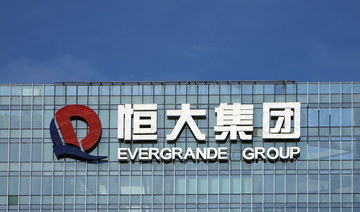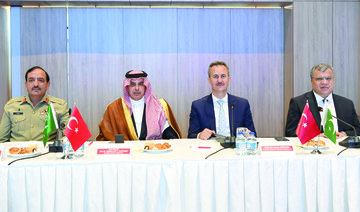ANKARA: After Israeli Finance Minister Bezalel Smotrich announced on Thursday that Israel intends to scrap its free trade agreement with Turkiye and impose a 100 percent tariff on other imports from the country in retaliation for Ankara’s recent decision to halt exports to Israel, eyes are now turning to imminent implications for regional trade.
The plan, which aims to reduce Israel’s dependence on Turkiye, has not been finalized yet and will have to be submitted to the Cabinet for approval.
If approved, all reduced tariffs on goods imported from Turkiye under the current free trade agreement would be abolished, while a tariff of 100 percent of the value of the goods would be imposed on all imported products, in addition to the existing tariff.
Experts note that trade ties between the two countries had been mostly insulated from political disagreements in the past. Trade continued when diplomatic relations hit rock bottom, especially between 2010 and 2020, a politically tense period during which parties chose not to burn “trade bridges.”
But this time, Turkiye’s continuation of trade relations with Israel while at the same time being vocal in denouncing its war in Gaza stirred public reaction significantly ahead of the March 31 local elections, when large crowds and some Islamist breakaway parties criticized the government for not taking a hardline stance against Israel and for not matching rhetoric with action.
In late April, Turkiye, whose bilateral trade with Israel was worth about $7 billion a year, announced it would impose trade restrictions on 54 products exported to Israel until a permanent ceasefire in Gaza was declared.
The product range was diverse, from cement to dry food, iron, steel, and electrical devices.
However, companies have three months to fulfill existing orders via third countries.
In his statement, Smotrich described Turkiye’s move as a serious violation of international trade agreements to which Ankara is a signatory.
He added that Israel’s latest decision would last as long as President Recep Tayyip Erdogan remained in power.
Turkiye and Israel have had a free trade agreement since the mid-1990s, making Ankara a key commercial partner for Israeli importers. Relatively cheap imports were transited quite quickly, and Turkiye was Israel’s fifth-largest source of imported goods.
Israel mainly imported steel, iron, motor vehicles, electrical devices, machinery, plastics, and cement products, as well as textiles, olive oil, and fruits and vegetables from Turkiye, while Turkiye mostly bought chemicals, metals, and some other industrial products from the Middle Eastern country, with Turkiye’s trade with Israel tilted in Ankara’s favor.
“Since Erdogan announced that Turkiye would impose a trade ban on imports and exports from Israel, Israeli officials have been trying to determine how best to respond,” Gabriel Mitchell, a policy fellow at the Mitvim Institute, told Arab News.
“The first was Foreign Minister Israel Katz, who criticized Turkiye’s decision and later announced that Turkiye had lifted many of the restrictions. This put pressure — once again — on Erdogan to show the Turkish public that he is willing to ‘put his money where his mouth is’ with Israel and forced the Turkish government to deny these rumors,” he said, adding that it also compelled “Erdogan to be even more vocal in his criticism of Israeli policy.”
According to Mitchell, Smotrich — who is a minister but not a member of the Likud party — saw this as an opportunity to make his own headlines in proposing the move to cancel the free trade agreement.
As this move requires Cabinet approval, Mitchell said he would be very surprised if it were approved.
“It would be an escalatory step and undoubtedly have serious short-term economic consequences,” he said.
“It is important to bear in mind the domestic situation in Israel. There is increasing pressure on Netanyahu, and as a result, the more radical voices feel that by pushing populist policies, they are in a win-win situation: Either their policy is adopted, and they get credit for the idea, or it is rejected by others in the government, and they can criticize them for being soft,” Mitchell added.
“Erdogan is very unpopular in Israel — arguably the most unpopular regional leader — so some believe that while there are voices in Israel that would oppose the decision, there are many that would go along with it without really understanding the economic implications.”
Mitchell also noted a caveat, saying that the free trade agreement would be canceled until Erdogan steps down.
“I don’t understand what that means, given that such agreements are made bilaterally. Who is to assume that in 2028, Erdogan will no longer be president, and whoever succeeds him will be interested in signing a free trade agreement with Israel? It is a risky approach,” he said.
“My final point, and it is worth considering, is that Smotrich also wrote (in) a letter to Netanyahu that ‘representatives of Turkiye’s president, the anti-Semitic enemy of Israel, Erdogan’ were involved in the hostage negotiations — so it all gets mixed up and confused,” Mitchell added.
Continuing its strong rhetoric, Turkiye recently announced that it would join South Africa’s genocide case against Israel at the International Court of Justice.
From its side, Israel filed a complaint to the Organization for Economic Cooperation and Development against Turkiye over the latter’s decision to suspend trade with Israel.
Sinan Ulgen, director of the Istanbul-based think-tank EDAM and a visiting fellow at Carnegie Europe, says Israel’s latest decision should be seen as an economic and political response to the Turkish government’s earlier decision to impose a trade embargo on Israel.
“The economic impact can be significant, especially on some of Israel’s critical products imported from Turkiye, such as construction materials, including cement. However, this does not mean Israel couldn’t import these items from other countries.
“But for Israel, it would be a costly trade diversion, and it will increase the internal cost of these products and possibly have an impact on domestic inflation,” he told Arab News.
Israel imports about a third of its cement and almost 70 percent of its iron construction materials from Turkiye.
“Another consequence is that unlike Turkiye’s decision to impose a temporary trade embargo with conditions, Israel is now moving in the direction of essentially imposing a permanent and lasting measure, which is to cancel a free-trade agreement that has been in place since the mid-1990s,” Ulgen said.
After the Turkish boycott of all trade with Israel, prices, especially in the housing sector, are expected to increase gradually, pushing up the cost of living in Israel.
Ulgen noted, however, that Turkish products could still indirectly reach Israel through third countries, for example, by transiting from the EU because Turkiye and the EU have a customs union. However, alternative transportation trade routes that circumvent the restrictions can be longer, more complex, and costlier.






















